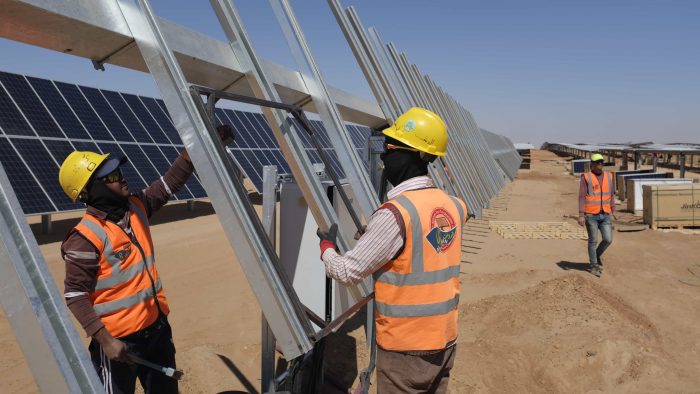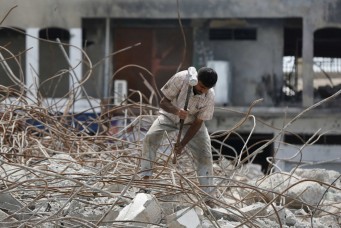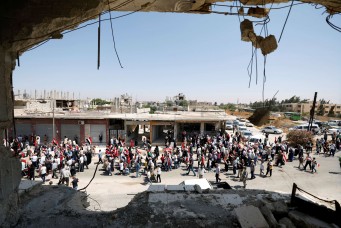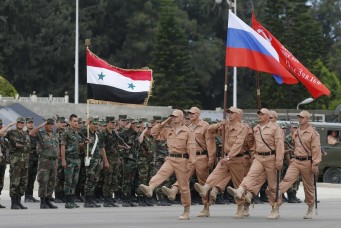When the Shooting Stops
The president of the European Bank for Reconstruction and Development highlights the bank’s commitment to supporting post-conflict nations in the Middle East and beyond

Benban Solar Plant Egypt, the largest of sixteen solar parks developed by the EBRD in Africa, Feb. 19, 2019. Jonathan Wells/EBRD
The European Bank for Reconstruction and Development (EBRD) was set up at the end of the Cold War to facilitate progress toward “market-oriented economies and the promotion of private and entrepreneurial initiative”. Its theater of operations would be, it was assumed at the time, the former communist states of Eastern Europe and the Soviet Union.
The actual reconstruction and development our founders had in mind when they chose our name was supposed to remedy the legacy of decades of inefficient and environmentally harmful central planning. The EBRD was never going to get involved in post-conflict work, either when the shooting stopped or even considerably later. Or so the founders thought.
Yet, before we knew it, that was exactly the territory the bank found itself in, in the Western Balkans, dealing with the aftermath of not one, but several conflicts. More recently, our shareholders—among them sixty-nine countries from five different continents—have instructed us to expand into new regions, most notably the Middle East and North Africa.
Overview of Post-Conflict Challenges in the Middle East
As of the summer of 2019, the EBRD has invested almost 10 billion euros ($11 billion) in Egypt, Jordan, Morocco, Tunisia, Lebanon, and the West Bank. Other countries from the neighborhood are interested in joining us as members and recipients of our investments (most recently, Libya became an EBRD shareholder this July with a view to becoming a country where we work in the future). Some of them have been wracked by war and destruction in recent years but are now in sight of potential ceasefires and, we hope, compromise, agreement, and just possibly reconciliation.
I have no desire to be a twenty-first century version of Voltaire’s Doctor Pangloss, convinced that all is for the best in the best of all possible worlds. I realize that bloodshed on the scale we have witnessed over the past few years makes any inching toward transition, let alone wholescale transformation, difficult. However, given the horrifying slaughter, the displacement of millions of people, and the colossal economic costs these wars have inflicted, the region and the international community need to seize the moment. Allowing nascent chances for peace to sputter and then die would be to condemn these countries to more years of disaster. I accept that today many of the factors required to secure peace, security, and stability simply do not exist in different parts of the region. Yet, at the same time, I believe that we need to eye the horizon and prepare to deliver reconstruction and development when the shooting stops and the conflicts end.
What follows is not the EBRD playbook for any specific country. Nor is it my attempt to pen a comprehensive or rigorously academic treatise on the political science of post-conflict rebuilding of nations or economies. It is instead a series of personal observations, glimpsed from the sidelines of current conflicts. It is important to discuss the way forward for countries emerging from strife. We need to build an internal framework so that these nations in the Middle East and beyond can succeed, and we must secure long-term external support for peace while recognizing the balancing acts that are part of this complex rebuilding process.
The Need for Inclusivity
Internally, conflicts typically end either when one party or faction is victorious or thanks to mediation. In either case, it is imperative to ensure that the political process is inclusive. This is not merely a question of values. Conflict resolution transcends the need to establish political legitimacy on the ground. For one thing, an inclusive process—even one that proceeds via incremental steps— reduces the risk of conflict breaking out anew. Yet, such a big-tent strategy is often put at risk by the winner-takes-all attitude in which the victors impose a punitive peace on the vanquished. Here is one area where a balancing act is so important: the trade-off between peace and justice. The paradox is that, while we all want justice, its pursuit above all else can make securing lasting peace more difficult. At the same time, without justice in the mid- to long-term, peace just cannot be sustained. Reconciling peace and justice in the interests of all is thus a constant challenge.
Successful post-conflict leaders—one might even call them statesmen or stateswomen—strive to understand their opponents and include them in the political process. They thereby reduce tension and enhance their own legitimacy as well as increase overall levels of trust. These leaders succeed domestically but also have to be aware of the global context. Any serious post-conflict reconstruction and development campaign needs to build momentum not just nationally, but internationally as well. Every post-conflict country has to be aware of the confluence of interests and values in international stakeholders’ decision-making, indeed to leverage or even exploit the opportunities therein.
In the Western Balkans: An Investor Driven Post-Conflict Plan
The EBRD and other multilateral development banks can help by ensuring that the economic benefits of peace bear fruit—and that they are shared as equitably as possible across society. The Marshall Plan, albeit in a different context and age, was an excellent example of such success. A more recent one is the way the Western Balkans have, to a certain extent, freed themselves of the burden of their history, even though its ghosts still occasionally return to haunt the region. As they have done in the Western Balkans, international financial institutions must act in concert and help make life better for locals on the ground. The Western Balkan nations have worked closely with the European Union (EU). All post-conflict nations ought to be working jointly with at least one powerful external actor—and if possible with more than one. These external actors must then collaborate rather than compete in the post-conflict countries.
The Western Balkans region was unique in that it benefitted from a strategic anchor: the relationship with the EU and, for many of its countries, the prospect of EU enlargement. The opportunity to join the EU and share in its success, as well as the international security that comes with this, has helped stabilize the region and relaunch cooperation between Western Balkan nations. This is not the case in the Middle East and North Africa (MENA) region, or for that matter, most conflict zones around the world. However, one key point remains valid: those countries emerging from war and seeking the support of the international community will interact with the latter more smoothly if their objectives and trajectories are compatible with those of major international stakeholders.
The Three Pillars of Sustainable Peace
Beyond the juggling of interests of different domestic players to guarantee an inclusive political process and working with the international community in a coordinated way, there are three more areas worth highlighting as we seek to accelerate post-conflict reconstruction and development.
The first is strengthening the legal system. In the vast majority of cases, countries cannot deliver significant levels of sustainable development without first laying the foundations of an independent, properly functioning judiciary. This might sound idealistic for countries emerging from civil wars, especially since victors often attempt to concentrate as much power as possible in their hands. However, such an approach generally backfires, just as foregoing justice ends up perpetuating struggles. This is why taking significant steps toward developing the legal system and laying the foundation of a genuine rule of law is crucial.
The second area is setting the country on the path toward private sector participation in the development process. Private sector actors do not need central planning to guide, steer, or direct their activities. What they need—after the violence has ended—is an open commercial climate conducive to investment where the risk-return calculus is clear and fair. This touches on many areas of the economy and politics.
The authorities must commit to improving standards of governance within government and state institutions and must ensure that the private sector can operate free of cronyism. This means credible efforts to combat corruption and the abuse of power. There are several international institutions, including the EBRD, with much experience in supporting countries in different parts of the world, provided the right commitment and political will are there.
The third and last area is inclusiveness. Earlier I referred to inclusion in the context of the immediate aftermath of conflict. However, inclusion here is relevant to the long-term view of post-war societies. Besides lacking access to international investment, several MENA countries suffer major inequalities regarding the status of infrastructure, the provisioning of basic services, and the availability of jobs, not to mention access to finance. These differences are often acute in the hinterlands, where the greater the distance from major urban centers, the less opportunity people have to participate in their national, let alone the global, market.
Effective economic inclusiveness transcends geography. The authorities in post-conflict nations must have workable plans for the inclusivity of women and young people in the domestic market with quick wins. This is particularly important in societies emerging from war and strife where the percentage of households in which women are the sole breadwinner tends to be high.
Without serious work in these three areas, a country risks marginalizing its potential private sector actors. It also risks becoming a long-term recipient of aid, rather than investment. Until a post-conflict country genuinely incentivizes its private sector and appeals to foreign investors—thus attracting the significant volumes of investment only they can provide—the country will be hard pressed to travel the path of sustainable development.
For us at the EBRD, respect for the rule of law, the commitment to improving standards of governance, and genuine efforts toward inclusiveness are part of a bigger package. The EBRD is unique in that its mandate is also political. It works only in countries that are moving in the direction of multi-party-based democracy. So, for us, no successful transition of this kind is ever just a matter of mapping a route away from the horrors of war to the promised land of economic development. Domestic politics and values are crucial here, as is momentum to strengthen genuine democratic representation, proper checks and balances, and respect for human rights.
Past Multilateral Successes, Future Bilateral Challenges
Given our experience of long and sometimes fraught exchanges with partner governments, we at the EBRD appreciate that definitions and points of view differ. We cannot see eye to eye on everything. That holds true for politically stable countries and for those emerging from bloody conflict. However, the onus to create change rests, largely, on the governments of those countries seeking to put war and destruction behind them and take the path of growth and development. It is up to them to demonstrate that their efforts to improve the legal system, the investment climate, and inclusivity in their nations are anchored in an equal commitment to the journey toward democracy.
The experience of the Western Balkans is of particular relevance here. I am not arguing that the EBRD’s record in the region offers the only template for post-conflict reconstruction and development. However, I am convinced that we can learn much from the region that gave the world the expression “Balkanization,” which used to be a byword for intractable hatred but is now, sometimes stutteringly, a symbol of reconciliation and cooperation. I am proud of the role the EBRD, as a multilateral development bank, has played in this process of peace and growth across the Western Balkans. It was, for example, the EBRD that first organized—and hosted at our headquarters in London only five years ago—a meeting of the region’s six prime ministers.
Yes, the region’s physical proximity to the European Union has been a major factor in this success story, but I believe that many of the lessons we have learned from the Western Balkans are applicable elsewhere—and could deliver similar results. Not that this will be easy. The sort of multilateralism that helped bring about such progress in the Western Balkans is under strain. New tensions divide the world’s great powers. Alliances in general are increasingly ad hoc rather than long-term. Countries are more and more asserting their needs and defending their interests through bilateral relationships.
Our commitment to multilateralism remains strong, as does our readiness to join forces with other international organizations. A world without stable multilateral frameworks is more erratic, less predictable, and hence less likely to help countries enjoy sustainable and inclusive growth and heal the wounds suffered in conflicts. Indeed, such a world is, I am afraid, more likely to start such conflicts and will be less equipped to stop them once they break out. Increasing bilateralism in the world makes post-conflict reconstruction and development all the more important. We at the EBRD have carried out such post-conflict work before. We can do so again.




